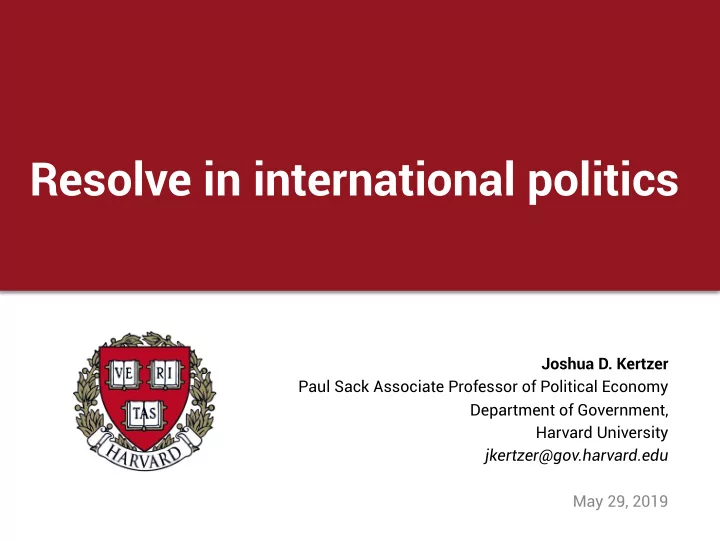

Resolve in international politics Joshua D. Kertzer Paul Sack Associate Professor of Political Economy Department of Government, Harvard University jkertzer@gov.harvard.edu May 29, 2019
Political psychology in international relations • Mass public – Public opinion about foreign policy – Public diplomacy, counterinsurgency, information warfare • Elite decision-makers – Leaders and foreign policy decision-making 2
Today’s focus: the psychology of resolve Joshua D. Kertzer, Resolve in International • Politics (Princeton University Press, 2016). Joshua D. Kertzer, “Resolve, Time, and • Risk”, International Organization 71(S1), 2017, S109-S136. Joshua D. Kertzer, “Microfoundations in • International Relations”, Conflict Management and Peace Science 34(1), 2017, 81-97. Joshua D. Kertzer, Jonathan Renshon and • Keren Yarhi-Milo, “How Do Observers Assess Resolve?”, British Journal of Political Science , 2019. Keren Yarhi-Milo, Joshua D. Kertzer and • Jonathan Renshon, “Tying Hands, Sinking Costs, and Leader Attributes”, Journal of Conflict Resolution 62(10), 2018, 2150- 2179. 3
Outline of today’s talk 1. Political psychology in international politics Focusing in particular on the psychology of resolve – 2. Resolve’s central role in international politics The same reason why resolve matters also makes it hard to study – 3. Two puzzles about resolve: Explaining variation in resolve – – Explaining assessments of resolve at a distance 4
Resolve in international politics Resolve Capabilities Outcomes 5
Resolve: our favorite explanatory variable • Audience costs Fearon 1994 • Asymmetric conflict Mack 1974 • Casualty sensitivity in public opinion Mueller 1980 • Conflict outcomes Rosen 1972 • Crisis bargaining Snyder & Diesing 1977 • Democratic behavior in wartime Reiter & Stam 2002 • Deterrence Huth and Russett 1984 • Informational theories of democratic peace Schultz 1999 Resolve • Mediation outcomes Rauchhaus 2006 • Morale Shils & Janowitz 1948 • National will Morgenthau 1967 • Opportunity and willingness Most & Starr 1989 • Reputation Yarhi-Milo 2018 • Signaling Schelling 1960 • Terrorism Kydd & Walter 2006 6
The challenge of measuring resolve 7
Resolve as the interaction of stakes and traits 8
Testing the interactionist theory of resolve 1.Explaining variation in resolve in public opinion towards military interventions • Laboratory experiment, plus survey experiment in nationally representative sample of Americans • Experimentally manipulate situational features • Measure dispositional characteristics in pre-political domains 2.How does resolve affect state behavior? • Analysis of great power military interventions, 1946- 2003 • Measure situational features • Measure dispositional characteristics • Estimate their interaction in Boolean statistical framework 9
Key findings 1.Resolve is an interaction: situational x dispositional 2.Dispositional traits are especially important – Same traits we study when explaining variation in willpower more generally 3.Resolve matters even when it’s measured independently of the outcome we use it to explain 10
Challenge of assessing resolve • Resolve’s unobservability à importance of understanding how actors assess resolve • Assessing resolve as an “ill-structured problem”: – Given complex information environment, which indicators do observers use to draw inferences about resolve? • Capabilities? • Interests? • Past actions? (And in which contexts?) • Costly signals? • Domestic politics? • Leader-level characteristics? 11
Methodological approach • Choice-based conjoint experiments (mass public) • Experiments on elite decision-makers 12
Results Low Capabilities High Capabilities Capabilities & interests Low Stakes High Stakes Dictatorship Regime Democracy type Mixed Ally Relationship with USA Adversary Established Leader New Leader No Military Service Leader Some Military Service characteristics Long Military Service Female Leader Male Leader -0.2 -0.1 0.0 0.1 0.2 Average marginal component effect (AMCE) (Positive values equal greater resolve) 13 Horizontal bars denote 95% clustered bootstrapped confidence intervals
Results Target Initiator Against ally Past behavior Against adversary in previous foreign policy Different leader, stood firm crisis Same leader, stood firm Same leader, backed down Different leader, backed down Nothing Current Mobilized troops behavior Public threat -0.2 -0.1 0.1 0.2 Average marginal component effect (AMCE) (Positive values equal greater resolve) 14
Extending results to elites • Experiments on elite decision-makers – 89 current and former members of the Israeli Knesset – 64% of sample served on Foreign Affairs and Defense Committee 15
Results • Striking similarities in assessments of resolve 16
Results • Striking similarities in assessments of resolve 17
Conclusion • Applying insights from political psychology to the study of resolve • Next directions – Cross-cultural variations in assessments of resolve – Differences between elite and mass cognition – Aggregation in foreign policy decision-making 18
Recommend
More recommend